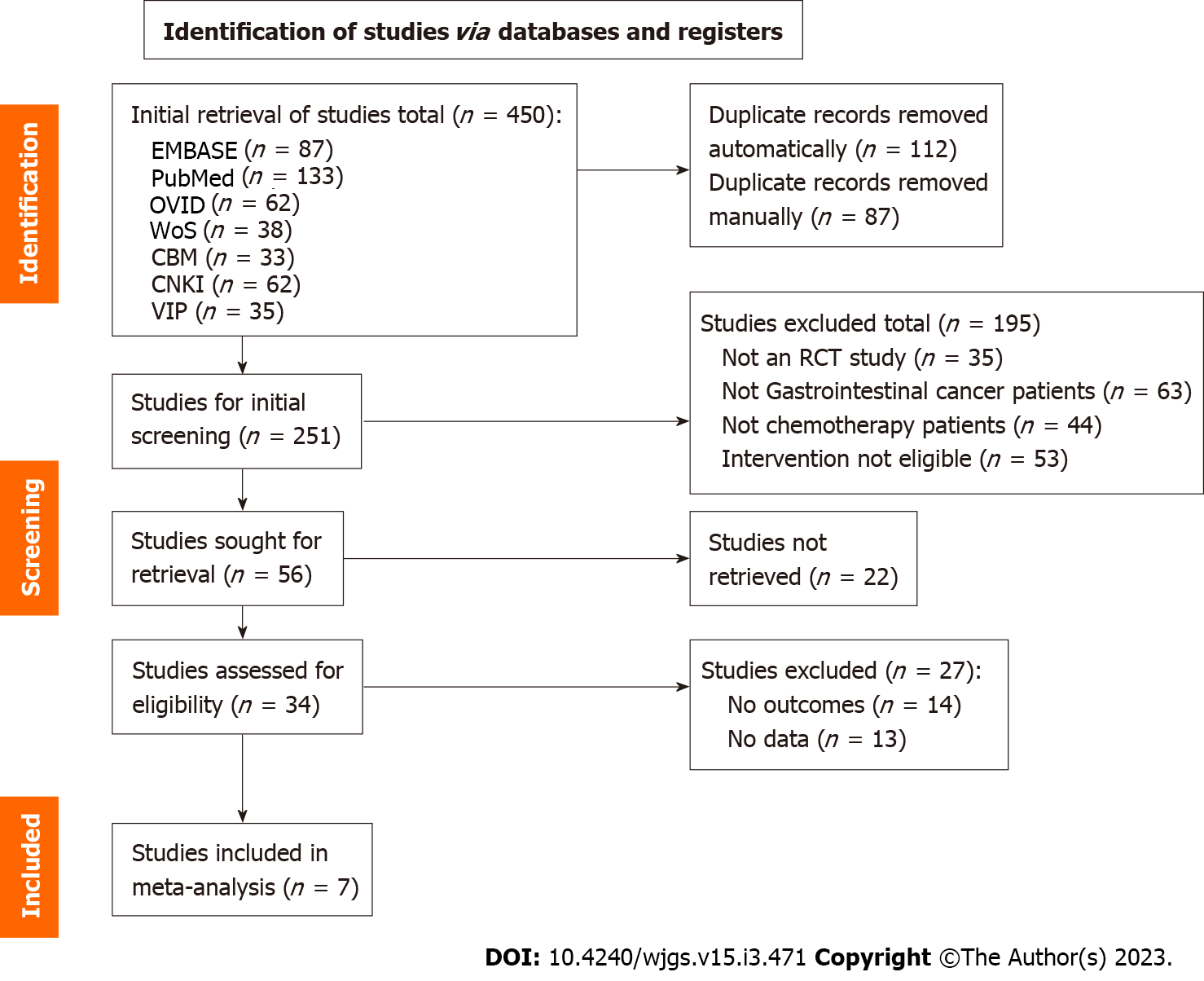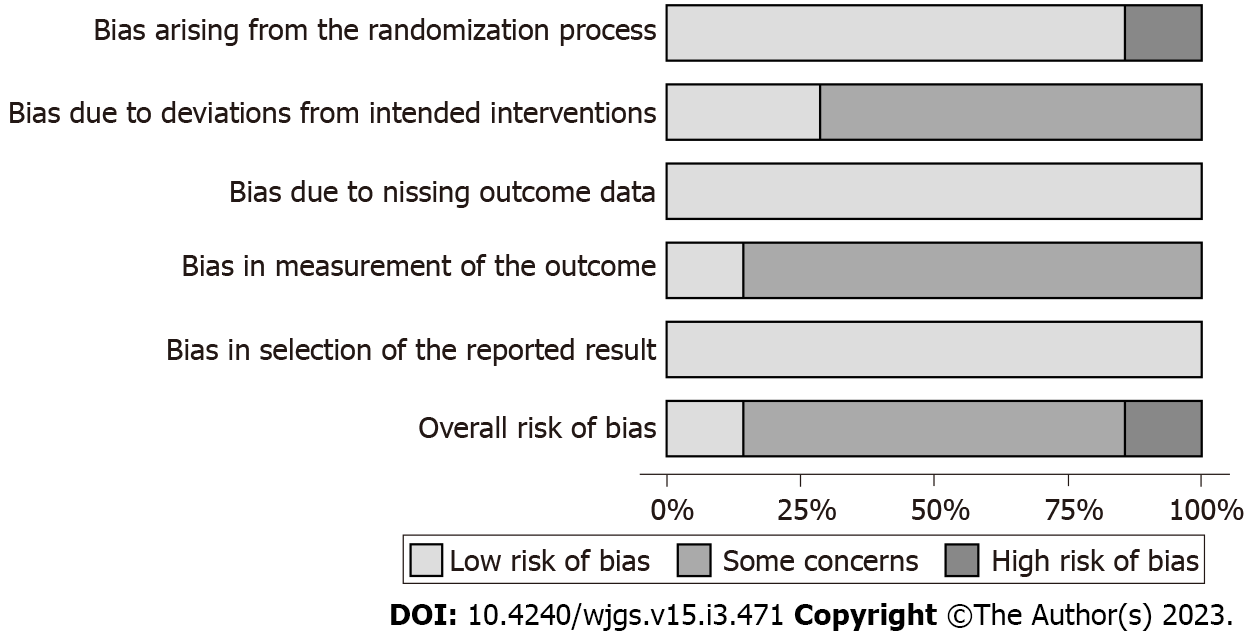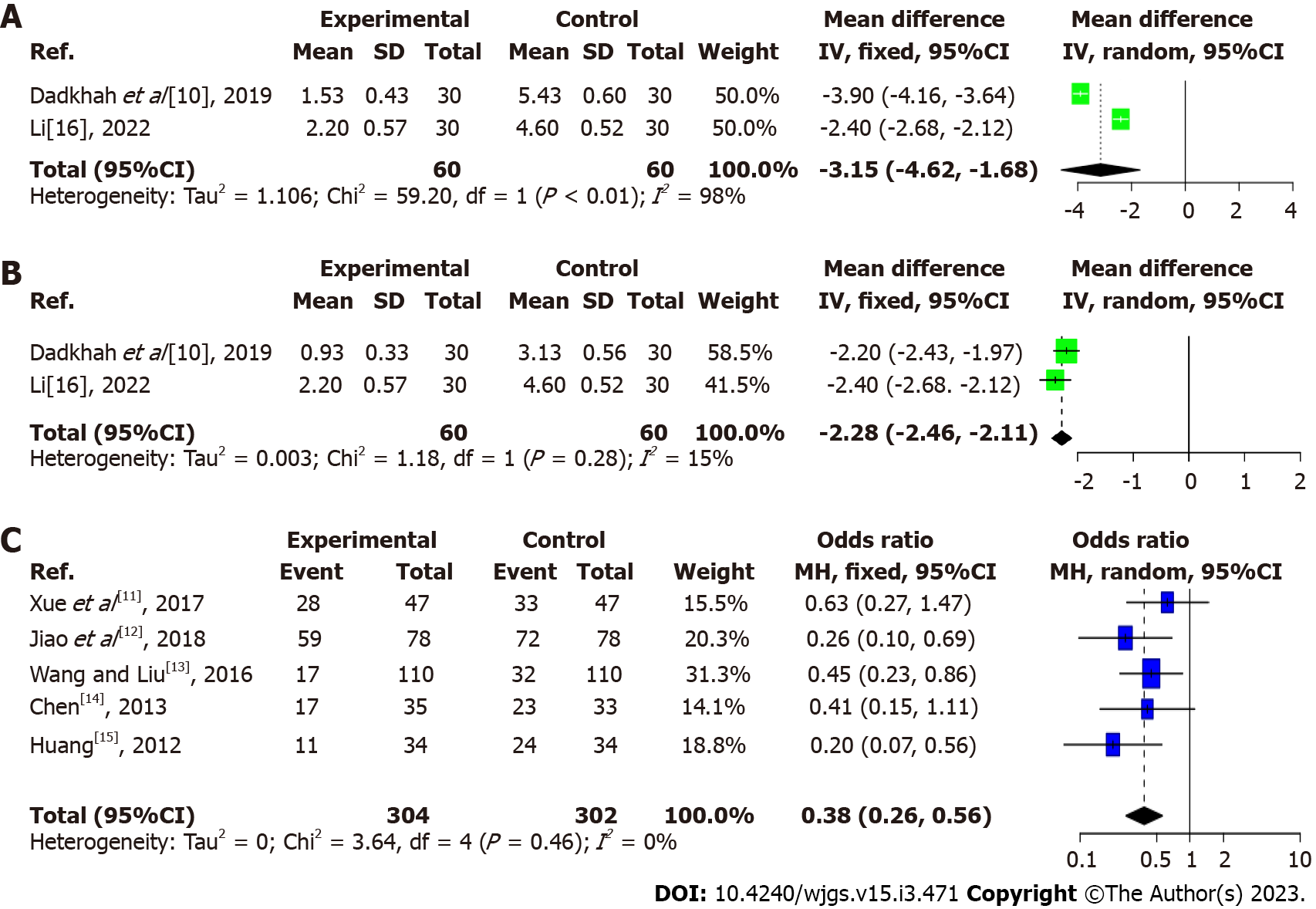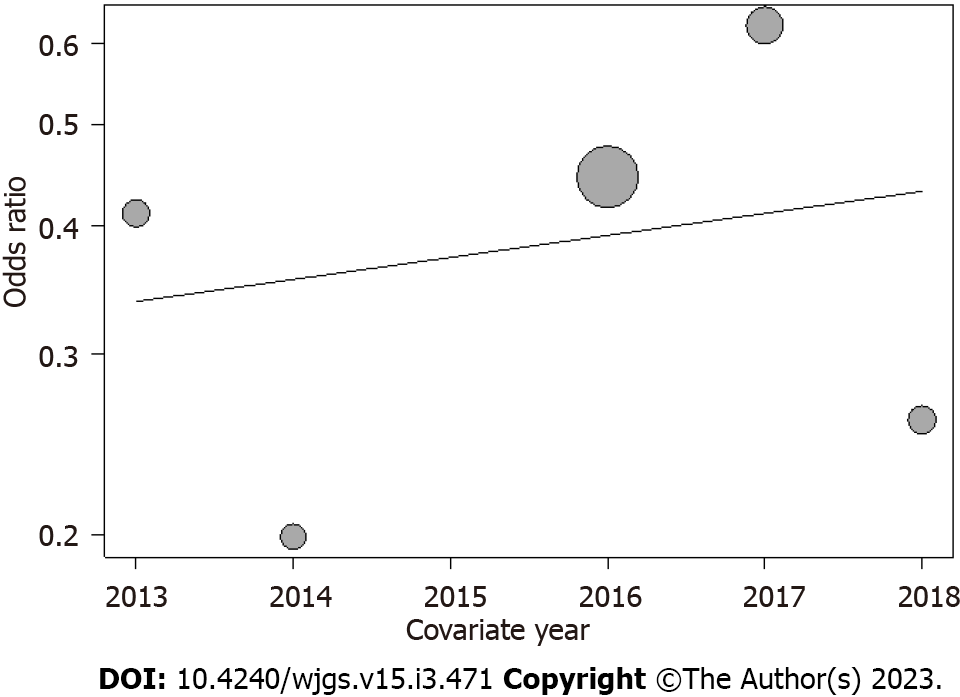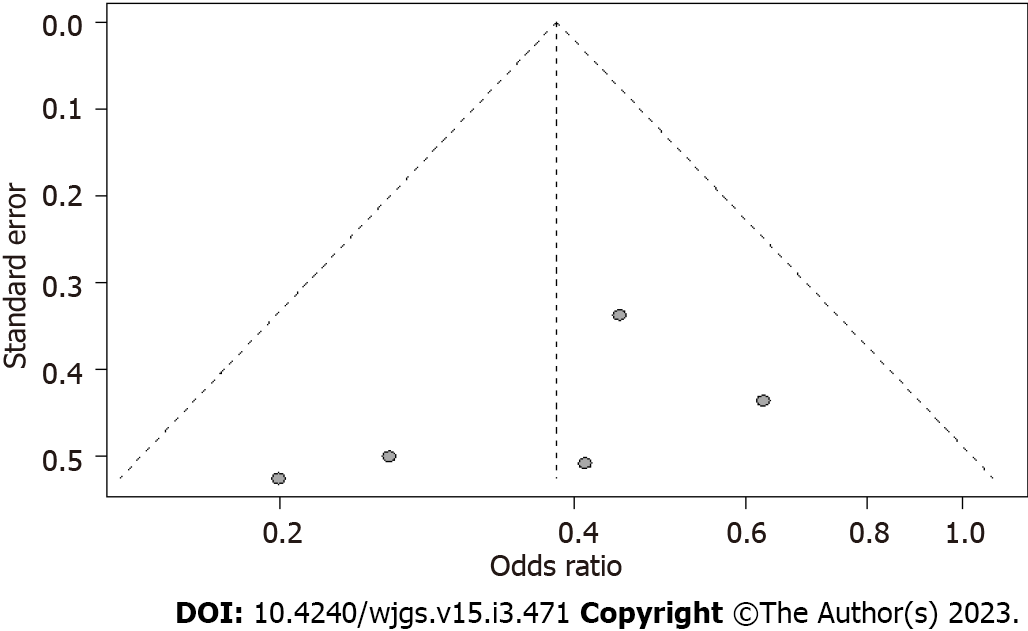Published online Mar 27, 2023. doi: 10.4240/wjgs.v15.i3.471
Peer-review started: January 11, 2023
First decision: January 30, 2023
Revised: February 6, 2023
Accepted: February 27, 2023
Article in press: February 27, 2023
Published online: March 27, 2023
Processing time: 75 Days and 4.9 Hours
Chemotherapy is the primary treatment for patients with advanced gas
To investigate the impact of music therapy on relieving gastrointestinal adverse reactions in chemotherapy for patients with digestive tract cancer by meta-analysis.
EMBASE, PubMed, OVID, WoS, CNKI, CBM, and VIP database were all used for searching relevant literature, and the efficacy after treatment was combined for analysis and evaluation.
This study included seven articles. The results of meta-analysis indicated that music therapy could reduce the nausea symptom score of patients after chemotherapy [mean difference (MD) = -3.15, 95% confidence interval (CI): -4.62 to -1.68, Z = -4.20, P < 0.0001]. Music therapy could reduce the vomiting symptom score of patients after chemotherapy (MD = -2.28, 95%CI: -2.46 to -2.11, Z = -25.15, P < 0.0001). Furthermore, music therapy could minimize the incidence of grade I and above nausea or vomiting in patients after chemotherapy (odds ratio = 0.38, 95%CI: 0.26-0.56, Z = -4.88, P < 0.0001). Meta-regression analysis found that publication year was not a specific factor affecting the combined results. There was no significant publication bias (P > 0.05).
Music therapy can significantly improve the scores of nausea and vomiting symptoms in patients with digestive system cancer during chemotherapy and reduce the incidence of grade I and above nausea and vomiting after chemotherapy, making it an effective psychological intervention method worthy of clinical promotion.
Core Tip: Music therapy bases on the theories and methods of psychotherapy. It helps human body to react positively under various stress conditions through psychological adjustment, interest improving, and anxiety symptoms reduction. Music therapy plays a role in improving the negative emotions of cancer patients. However, whether it could reduce nausea and vomiting caused by chemotherapy still remains unknown. In this meta-analysis, we searched the public databases for relevant articles and pooled the results of the symptom scores and incidence of chemotherapy-induced nausea and vomiting to further discussion.
- Citation: Zhong FP, Zhong J, Zhong MY. Effect of music therapy on chemotherapy-induced nausea and vomiting in gastrointestinal cancer: A systematic review and meta-analysis. World J Gastrointest Surg 2023; 15(3): 471-479
- URL: https://www.wjgnet.com/1948-9366/full/v15/i3/471.htm
- DOI: https://dx.doi.org/10.4240/wjgs.v15.i3.471
The basic types of gastrointestinal malignant tumors include esophageal cancer, liver cancer, and pancreatic cancer. Surgery is the first option for the treatment of the disease. However, most patients are in the late stage of the tumor at the time of treatment and lose the chance of surgical treatment. Chemotherapy has become the standard treatment, but many adverse reactions, such as bone marrow suppression, gastrointestinal reactions, neurotoxicity, etc, directly affect the digestion and absorption function of patients, resulting in malnutrition. Chemotherapy-induced nausea and vomiting gastrointestinal reactions are among the most common adverse reactions during chemotherapy in cancer patients[1,2]. Various clinical data confirmed that even if the latest antiemetics are used during chemotherapy, 60% of chemotherapy patients experience nausea and vomiting. Severe nausea and vomiting reduce the quality of life of cancer patients and affect the progress of chemotherapy courses[3]. Therefore, timely and effective prevention and relief of nausea and vomiting caused by chemotherapy are of great significance to improving the quality of life of cancer patients and ensuring the smooth progress of chemotherapy. Music therapy can reduce anxiety symptoms, avoid the response to the human body under various stress conditions through psychological adjustment, and has a positive effect on improving the adverse reactions of chemotherapy[4,5]. Music therapy has been used in treating primary cancers such as lung cancer and breast cancer and plays a huge role in relieving anxiety before surgery and reducing the dosage of anesthetics[6,7]. However, the research on nausea and vomiting caused by chemotherapy for gastrointestinal cancer remains controversial. Thus, we implemented this meta-analysis study as it is an effective method to resolve the above controversy.
The relevant articles on this topic were obtained in October 2022 by searching EMBASE, PubMed, OVID, WoS, CNKI, CBM, and VIP database and selecting the publication deadline of October 2022. The keywords used in the search strategy were “music therapy”, or “music intervention”, or “audio program”, or “chemotherapy-induced nausea and vomiting”, or “CINV”.
The following literature was included based on the PICOS principle: (1) Study types: Randomised controlled trials were preferred, but a retrospective cohort study was also performed; (2) Study subjects: Gastrointestinal cancer was the primary disease of all study subjects, which could be any of esophageal cancer, colorectal cancer, and pancreatic cancer, where patients were treated with chemotherapy; (3) Intervention group: Music therapy, which was adopted could be performed before chemotherapy, or throughout the chemotherapy process, and the selected repertoire, duration, and treatment methods were different according to different studies, and other relaxation methods could be superimposed, such as massage, aroma therapy, and other relaxation methods; (4) Control group: Routine intervention was adopted; (5) Outcome indicators: The scores of nausea and vomiting symptoms assessed using the scale as well as the number and proportion of nausea and vomiting grade I and above after chemotherapy[8].
Patients with non-primary gastrointestinal cancer, such as lung cancer, breast cancer, uterine cancer, etc, non-chemotherapy patients; literatures in which music therapy is not used in the intervention measures, or music therapy is only used as an adjuvant will be excluded; study types of investigation, case analysis, and review were excluded.
The risk of bias in the literature was evaluated using the Cochrane risk of bias V2.0[9] provided by Cochrane Collaboration, which included six levels, with each level assigned “low”, “some concern of risk” and “high” for risk evaluation.
Two authors independently extracted data, which included title, author name, publication year, number of participants, gender, grouping, and outcome indicators. Gastrointestinal reactions were graded in some studies as follows: (1) Grade 0: No nausea or vomiting; (2) Grade I: Mild nausea and vomiting, no effect on eating, vomiting frequency not more than once a day; (3) Grade II: Significant nausea and vomiting, affecting eating, vomiting frequency 2-5 times a day; (4) Grade III: Severe nausea and vomiting, persistent attacks, unable to eat, vomiting frequency > 5 times a day; and (5) Grade IV: Nausea and vomiting could not be controlled. The number of cases of nausea and vomiting in grade I and above shall predominate in the statistical results.
Odds ratio (OR) was used for dichotomous variables, and SMD was used for continuous variables as the analysis statistic. Descriptive statistics were compared using forest plots. For heterogeneity, the Q test was used. For P < 0.05, heterogeneity among studies was considered. The I2test was used for quantitative analysis of inconsistency among different studies. If I2< 50%, a fixed effect model was used, else the random effect model was used. Subgroup analysis method is adopted to investigate the heterogeneity, and if there is no heterogeneity, a descriptive method is used to investigate the heterogeneity between articles. Investigating factors meaningful for effect size by using meta-regression. The articles were eliminated one by one, and the combined effect size of the remaining articles was calculated to determine the greatest impact on the results. Egger’s test was used to detect the publication bias, and a funnel plot was used for the presentation.
Finally, seven articles were screened by search. Figure 1 depicts the retrieval results, whereas Table 1 presents the baseline information of these articles.
| Ref. | Number of cases | Number (E/C) | Age (yr) | Primary cancer type | Intervention measures | Control intervention | Outcome indicators |
| Dadkhah et al[10], 2019 | 60 | 30/30 | 56 ± 8.84 | Gastrointestinal neoplasm | Relaxing music 45 min before chemotherapy | Conventional treatment | Scale score |
| Xue et al[11], 2017 | 94 | 47/47 | 54.1 ± 10.7 | Gastric cancer | Music therapy was performed 2 h before each chemotherapy, twice a day, 30 min/time, with muscle relaxation training according to the patient’s characteristics | Conventional treatment | Number of nausea and vomiting |
| Jiao et al[12], 2018 | 156 | 78/78 | 54.8 ± 17.20 | Gastrointestinal neoplasm | Light music and instrumental music are the main ones, supplemented by patient’s self-selection | Conventional treatment | Number of nausea and vomiting |
| Wang and Liu[13], 2016 | 220 | 110/110 | 58.02 ± 6.18 | Colorectal cancer | Choose natural light music during chemotherapy and combine it with aromatherapy | Conventional treatment | Number of nausea and vomiting |
| Chen[14], 2013 | 68 | 35/33 | 55.9 | Esophageal cancer | Light and soft music played continuously for four weeks before chemotherapy | Conventional treatment | Number of nausea and vomiting |
| Huang[15], 2012 | 68 | 34/34 | 40-78 | Colorectal cancer | Gentle music played before chemotherapy | Conventional treatment | Number of nausea and vomiting |
| Li[16], 2022 | 60 | 30/30 | 65.51 ± 1.99 | Gastric cancer | Group music therapy mode with aerobic exercise | Conventional treatment | Scale score |
The article was grouped by order of admission and did not strictly follow the random sequence process[15], and there may be a large bias. All other articles described the generation method of random sequence. The allocation concealment method and blinding method were not described in those articles[11-14,16], and there was a potential bias of “deviation from established intervention”. Except for one article[10], no dropout cases were recorded as there may be data assessment bias shown in Figure 2.
Effect of music therapy on reducing nausea symptom scores: Among the reports, nausea symptom score after the intervention was reported in two articles[10,16], with statistical heterogeneity between them (I2= 98%, P < 0.01). Meta-analysis indicated that music therapy could reduce nausea symptom scores after chemotherapy [mean difference (MD) = -3.15, 95% confidence interval (CI): -4.62 to -1.68, Z = -4.20, P < 0.0001] by random effect model, as shown in Figure 3A.
Effect of music therapy on reducing vomiting symptom scores: Among the reports, vomiting symptom score after the intervention was found in two articles[10,16], without statistical heterogeneity (I2= 15%, P = 0.28). Meta-analysis indicated that music therapy could reduce vomiting symptom scores after chemotherapy in patients (MD = -2.28, 95%CI: -2.46 to -2.11, Z = -25.15, P < 0.0001) by fixed effect mode, as shown in Figure 3B.
Effect of music therapy on reducing the incidence of nausea and vomiting (grade I and above): Five articles reported the incidence rate of grade I nausea or vomiting or above after intervention, without statistical heterogeneity between articles (I2 = 0%, P = 0.46)[11-15]. Meta-analysis indicated that music therapy could reduce the incidence rate of grade I nausea or vomiting or above after chemotherapy (OR = 0.38, 95%CI: 0.26-0.56, Z = -4.88, P < 0.0001) by fixed effect mode, as shown in Figure 3C.
Investigation of heterogeneity: Subgroup analysis could not be performed due to the small number of articles. The two included articles showed heterogeneity in the statistics of nausea symptom scores, which could be attributed to the different scales adopted by the two articles for nausea and vomiting symptoms.
Meta-regression analysis: In analyzing the incidence of nausea and vomiting indicators, we used the “publication year of the literature” to regress pooled effect size. We found that this factor had no statistically significant effect on the results (P = 0.68), implying that the results of this indicator were not related to the publication year and month of the literature, as shown in Figure 4.
Sensitivity analyses: No significant deviations were found after removing each study during the analysis of incidence indicators of nausea and vomiting, indicating that the final pool results were stable.
Publication bias analysis: Egger’ t test was used to detect the publication bias during the analysis of nausea and vomiting incidence indicators, t = -1.20, P = 0.30. There was no asymmetry in the funnel plot, as shown in Figure 5.
Music therapy is not yet a well-defined science that uses music to promote physical and mental health based on its practical functions[17,18]. Chemotherapy is one of the important means to treat malignant tumors. Chemotherapy kills tumor cells while also bringing many adverse physical and psychological reactions to patients, such as bone marrow suppression, nausea, vomiting, anxiety, and depression, reducing the quality of life of patients[19]. Psychosocial intervention helps to alleviate the adverse reactions of chemotherapy and improve the quality of life of patients. Music therapy is a psychological intervention method that can improve the physical and mental health of cancer patients without causing adverse reactions[20-22].
Seven articles were included in this study to explore the effect of music therapy on adverse reactions during chemotherapy for primary cancer of the digestive system. The results indicated that music therapy could significantly improve nausea and vomiting symptom scores during chemotherapy of patients with digestive system cancer and reduce the incidence of nausea and vomiting after chemotherapy (grade I and above), which was a good psychological intervention method.
The frequency, rhythm, and regular acoustic vibration of music are physical energies that can produce harmonious resonance phenomena in human tissue cells, resulting in excitation or inhibition of the corresponding organs. Simultaneously, music can improve the excitability of God meridian cells and secrete some beneficial and healthy hormones, enzymes, acetylcholine, and other substances via neurohumoral regulation, all of which contribute to improved blood circulation and strengthening metabolism. Furthermore, music stimulation can inhibit adjacent pain centers while stimulating the auditory center and reducing pain because the auditory center on the cerebral cortex is adjacent to the pain center. Music can also stimulate the body to release endorphins, increase the content of endorphins in the blood, and achieve the effect of relaxing the body and mind and relieving pain[23,24]. Subcortical centers like the hypothalamus control emotions such as joy, anger, mourning, and music, as a special language, can act directly on subcortical centers such as the hypothalamus through the auditory system plays a role in regulating emotions[25,26]. Music stimulation of the limbic system of the brain can also cause people to remember or consider related events, resonate in music therapy, and release adverse emotions and catharsis. Therefore, the psychological effects of music therapy on people mainly achieve a good psychological state of patients by regulating emotions[27]. Relaxation training with light music can counteract the negative effects of psychological and physical stress, restore balance and coordination of people’s physical and psychological spirits, which help individuals deal with life challenges more healthily, make involuntary reactions of the human body, such as heartbeat, respiration, and blood pressure, and epinephrine secretion in spontaneous control, and reduce the severity of adverse reactions caused by chemotherapy[28].
The music can be chosen by the healer or by the patient himself. Some studies suggest that music therapy should be patient-centered, and music selection should be individualized to meet everyone’s preference for music. The included article adopted the method used in this study where the investigators selected music primarily, whereas the patients self-selected music as a supplement and achieved good results[11]. Music therapy can also be combined with other intervention methods, such as progressive music and muscle relaxation training[11]. Aromatherapy is applied in music therapy in another study[13], and the group music therapy model is also adopted[16], combined with moderate aerobic exercise.
Although the results of the combined analysis indicated that music therapy had a significant effect on adverse reactions to chemotherapy, it must be recognized that music therapy is only a psychological intervention rather than a treatment for adverse reactions such as nausea and vomiting and patients receiving chemotherapy for moderately and highly emetogenic cancer, drugs such as 5-HT3 receptor antagonists should be given before chemotherapy to prevent serious gastrointestinal reactions.
Furthermore, this study has limitations due to insufficient evidence. First, too few included studies were related to the current low number of reports on this topic. Second, there were inconsistencies in the reported indicators. Some articles used the incidence of gastrointestinal reactions as an indicator, others used the symptom score as an indicator, and some others used the quality of life as an evaluation indicator. Although the articles, Dadkhah et al[10] and Li[16] reported the symptom scores of nausea and vomiting in patients after the intervention, the scoring tables adopted were different, which made the results heterogeneous. Only one of the seven included articles had a low risk of bias, indicating that the rest are of poor quality and have a high risk of bias. Therefore, further research on this topic is required. Music therapy could significantly improve nausea and vomiting symptom scores in patients with digestive system cancer during chemotherapy and reduce the incidence of grade I and nausea and vomiting after chemotherapy, making it an effective psychological intervention method.
This meta-analysis included a total of 726 patients in 7 articles. The result is that music therapy can significantly improve the score of nausea and vomiting symptoms in patients with digestive system cancer during chemotherapy, reduce the incidence of nausea and vomiting at grade I and above after chemotherapy, and is a good psychological intervention method. However, due to the small number of articles included in this study, the evidence is not good enough. This subject still needs to be further explored by larger number of randomized controlled studies.
Music therapy can reduce anxiety symptoms, avoid the response to the human body under various stress conditions through psychological adjustment, and has a positive effect on improving the adverse reactions of chemotherapy. Music therapy has been used in treating primary cancers such as lung cancer and breast cancer and plays a huge role in relieving anxiety before surgery and reducing the dosage of anesthetics.
Music therapy plays a role in improving the negative emotions of cancer patients. However, whether it could reduce nausea and vomiting caused by chemotherapy still remains to be explored.
To explore whether music therapy has a positive impact on the improvement of nausea and vomiting symptoms in patients with gastrointestinal cancer during chemotherapy.
A few relevant articles of this subject have been searched from the public databases. The data of the outcome indicators have been extracted from the articles. A meta-analysis has been performed for the pooling results.
Music therapy could reduce the nausea and vomiting symptom score of patients after chemotherapy, also it could reduce the incidence of grade I and above nausea or vomiting in patients after chemotherapy.
Music therapy is a good adjuvant therapy for improving the adverse reactions of chemotherapy.
Indicators for chemotherapy-induced nausea and vomiting have been determined and a meta-analysis has been performed for the pooling results of the indicators. The evidence was withdrawn from the process.
Provenance and peer review: Unsolicited article; Externally peer reviewed.
Peer-review model: Single blind
Specialty type: Gastroenterology and hepatology
Country/Territory of origin: China
Peer-review report’s scientific quality classification
Grade A (Excellent): 0
Grade B (Very good): B
Grade C (Good): C, C
Grade D (Fair): 0
Grade E (Poor): 0
P-Reviewer: Garcia-Anaya MJ, Spain; Muro K, Japan; Shin CM, South Korea S-Editor: Wang JJ L-Editor: A P-Editor: Wang JJ
| 1. | Gupta K, Walton R, Kataria SP. Chemotherapy-Induced Nausea and Vomiting: Pathogenesis, Recommendations, and New Trends. Cancer Treat Res Commun. 2021;26:100278. [RCA] [PubMed] [DOI] [Full Text] [Cited by in Crossref: 26] [Cited by in RCA: 90] [Article Influence: 18.0] [Reference Citation Analysis (0)] |
| 2. | Toniolo J, Delaide V, Beloni P. Effectiveness of Inhaled Aromatherapy on Chemotherapy-Induced Nausea and Vomiting: A Systematic Review. J Altern Complement Med. 2021;27:1058-1069. [RCA] [PubMed] [DOI] [Full Text] [Cited by in Crossref: 5] [Cited by in RCA: 18] [Article Influence: 4.5] [Reference Citation Analysis (2)] |
| 3. | Patel P, Robinson PD, Devine KA, Positano K, Cohen M, Gibson P, Holdsworth M, Phillips R, Spinelli D, Thackray J, van de Wetering M, Woods D, Cabral S, Sung L, Dupuis LL. Prevention and treatment of anticipatory chemotherapy-induced nausea and vomiting in pediatric cancer patients and hematopoietic stem cell recipients: Clinical practice guideline update. Pediatr Blood Cancer. 2021;68:e28947. [RCA] [PubMed] [DOI] [Full Text] [Cited by in Crossref: 8] [Cited by in RCA: 21] [Article Influence: 5.3] [Reference Citation Analysis (0)] |
| 4. | Zorba P, Ozdemir L. The Preliminary Effects of Massage and Inhalation Aromatherapy on Chemotherapy-Induced Acute Nausea and Vomiting: A Quasi-Randomized Controlled Pilot Trial. Cancer Nurs. 2018;41:359-366. [RCA] [PubMed] [DOI] [Full Text] [Cited by in Crossref: 22] [Cited by in RCA: 33] [Article Influence: 4.7] [Reference Citation Analysis (0)] |
| 5. | Valero-Cantero I, Martínez-Valero FJ, Espinar-Toledo M, Casals C, Barón-López FJ, Vázquez-Sánchez MÁ. Complementary music therapy for cancer patients in at-home palliative care and their caregivers: protocol for a multicentre randomised controlled trial. BMC Palliat Care. 2020;19:61. [RCA] [PubMed] [DOI] [Full Text] [Full Text (PDF)] [Cited by in Crossref: 6] [Cited by in RCA: 18] [Article Influence: 3.6] [Reference Citation Analysis (0)] |
| 6. | Li Y, Xing X, Shi X, Yan P, Chen Y, Li M, Zhang W, Li X, Yang K. The effectiveness of music therapy for patients with cancer: A systematic review and meta-analysis. J Adv Nurs. 2020;76:1111-1123. [RCA] [PubMed] [DOI] [Full Text] [Cited by in Crossref: 21] [Cited by in RCA: 60] [Article Influence: 12.0] [Reference Citation Analysis (0)] |
| 7. | Chirico A, Maiorano P, Indovina P, Milanese C, Giordano GG, Alivernini F, Iodice G, Gallo L, De Pietro G, Lucidi F, Botti G, De Laurentiis M, Giordano A. Virtual reality and music therapy as distraction interventions to alleviate anxiety and improve mood states in breast cancer patients during chemotherapy. J Cell Physiol. 2020;235:5353-5362. [RCA] [PubMed] [DOI] [Full Text] [Cited by in Crossref: 47] [Cited by in RCA: 131] [Article Influence: 26.2] [Reference Citation Analysis (0)] |
| 8. | Naito Y, Kai Y, Ishikawa T, Fujita T, Uehara K, Doihara H, Tokunaga S, Shimokawa M, Ito Y, Saeki T. Chemotherapy-induced nausea and vomiting in patients with breast cancer: a prospective cohort study. Breast Cancer. 2020;27:122-128. [RCA] [PubMed] [DOI] [Full Text] [Full Text (PDF)] [Cited by in Crossref: 10] [Cited by in RCA: 31] [Article Influence: 5.2] [Reference Citation Analysis (0)] |
| 9. | Sterne JAC, Savović J, Page MJ, Elbers RG, Blencowe NS, Boutron I, Cates CJ, Cheng HY, Corbett MS, Eldridge SM, Emberson JR, Hernán MA, Hopewell S, Hróbjartsson A, Junqueira DR, Jüni P, Kirkham JJ, Lasserson T, Li T, McAleenan A, Reeves BC, Shepperd S, Shrier I, Stewart LA, Tilling K, White IR, Whiting PF, Higgins JPT. RoB 2: a revised tool for assessing risk of bias in randomised trials. BMJ. 2019;366:l4898. [RCA] [PubMed] [DOI] [Full Text] [Cited by in Crossref: 6581] [Cited by in RCA: 15255] [Article Influence: 2542.5] [Reference Citation Analysis (0)] |
| 10. | Dadkhah B, Anisi E, Mozaffari N, Amani F, Pourghasemian M. Effect of Music Therapy with Periorbital Massage on Chemotherapy-Induced Nausea and Vomiting In Gastrointestinal Cancer: A Randomized Controlled Trail. J Caring Sci. 2019;8:165-171. [RCA] [PubMed] [DOI] [Full Text] [Full Text (PDF)] [Cited by in Crossref: 12] [Cited by in RCA: 15] [Article Influence: 2.5] [Reference Citation Analysis (0)] |
| 11. | Xue J, Zhang LY, Yang Q. [Study on music therapy to alleviate nausea and vomiting in cancer patients after chemotherapy and improve their quality of life]. J Nursing. 2017;24:70-72. [DOI] [Full Text] |
| 12. | Jiao YJ. [Study on the effect of music therapy on patients with gastrointestinal malignant tumor undergoing chemotherapy]. China Health Standards Manage. 2018;9:180-182. |
| 13. | Wang L, Liu YY. [Analysis of the efficacy of music combined with aromatherapy in colorectal cancer patients undergoing postoperative chemotherapy]. Chin J Modern Med. 2016;26:4. |
| 14. | Chen BH. [Evaluation of the effect of music therapy on relieving chemotherapy vomiting of esophageal cancer]. China Health Nutr (Mid term). 2013;423-424. |
| 15. | Huang YT. [Observation on the effect of music therapy on relieving nausea and vomiting during chemotherapy of colon cancer]. Massage Rehabilitation Med (Mid term). 2012;3:65-66. |
| 16. | Li J. [Observation on the effect of aerobic exercise combined with music therapy on patients with chemotherapy-induced sleep disorder of gastric cancer]. Chin Pract Med. 2022;17:180-182. [DOI] [Full Text] |
| 17. | Palmer JB, Lane D, Mayo D, Schluchter M, Leeming R. Effects of Music Therapy on Anesthesia Requirements and Anxiety in Women Undergoing Ambulatory Breast Surgery for Cancer Diagnosis and Treatment: A Randomized Controlled Trial. J Clin Oncol. 2015;33:3162-3168. [RCA] [PubMed] [DOI] [Full Text] [Cited by in Crossref: 89] [Cited by in RCA: 84] [Article Influence: 8.4] [Reference Citation Analysis (0)] |
| 18. | Deng C, Xie Y, Liu Y, Li Y, Xiao Y. Aromatherapy Plus Music Therapy Improve Pain Intensity and Anxiety Scores in Patients With Breast Cancer During Perioperative Periods: A Randomized Controlled Trial. Clin Breast Cancer. 2022;22:115-120. [RCA] [PubMed] [DOI] [Full Text] [Cited by in Crossref: 4] [Cited by in RCA: 28] [Article Influence: 7.0] [Reference Citation Analysis (0)] |
| 19. | Patel P, Robinson PD, Thackray J, Flank J, Holdsworth MT, Gibson P, Orsey A, Portwine C, Freedman J, Madden JR, Phillips R, Sung L, Dupuis LL. Guideline for the prevention of acute chemotherapy-induced nausea and vomiting in pediatric cancer patients: A focused update. Pediatr Blood Cancer. 2017;64. [RCA] [PubMed] [DOI] [Full Text] [Cited by in Crossref: 74] [Cited by in RCA: 79] [Article Influence: 9.9] [Reference Citation Analysis (0)] |
| 20. | Gramaglia C, Gambaro E, Vecchi C, Licandro D, Raina G, Pisani C, Burgio V, Farruggio S, Rolla R, Deantonio L, Grossini E, Krengli M, Zeppegno P. Outcomes of music therapy interventions in cancer patients-A review of the literature. Crit Rev Oncol Hematol. 2019;138:241-254. [RCA] [PubMed] [DOI] [Full Text] [Cited by in Crossref: 30] [Cited by in RCA: 59] [Article Influence: 9.8] [Reference Citation Analysis (0)] |
| 21. | Wong KC, Tan BWZ, Tong JWK, Chan MY. The Role of Music Therapy for Children Undergoing Cancer Treatment in Singapore. Healthcare (Basel). 2021;9. [RCA] [PubMed] [DOI] [Full Text] [Full Text (PDF)] [Cited by in RCA: 8] [Reference Citation Analysis (0)] |
| 22. | Bradt J, Dileo C, Magill L, Teague A. Music interventions for improving psychological and physical outcomes in cancer patients. Cochrane Database Syst Rev. 2016;CD006911. [RCA] [PubMed] [DOI] [Full Text] [Cited by in Crossref: 179] [Cited by in RCA: 148] [Article Influence: 16.4] [Reference Citation Analysis (0)] |
| 23. | Tola YO, Chow KM, Liang W. Effects of non-pharmacological interventions on preoperative anxiety and postoperative pain in patients undergoing breast cancer surgery: A systematic review. J Clin Nurs. 2021;30:3369-3384. [RCA] [PubMed] [DOI] [Full Text] [Cited by in Crossref: 12] [Cited by in RCA: 51] [Article Influence: 12.8] [Reference Citation Analysis (0)] |
| 24. | Stanczyk MM. Music therapy in supportive cancer care. Rep Pract Oncol Radiother. 2011;16:170-172. [RCA] [PubMed] [DOI] [Full Text] [Cited by in Crossref: 51] [Cited by in RCA: 60] [Article Influence: 4.3] [Reference Citation Analysis (0)] |
| 25. | Liu H, Gao X, Hou Y. Effects of mindfulness-based stress reduction combined with music therapy on pain, anxiety, and sleep quality in patients with osteosarcoma. Braz J Psychiatry. 2019;41:540-545. [RCA] [PubMed] [DOI] [Full Text] [Full Text (PDF)] [Cited by in Crossref: 19] [Cited by in RCA: 47] [Article Influence: 9.4] [Reference Citation Analysis (0)] |
| 26. | Rodríguez-Rodríguez RC, Noreña-Peña A, Chafer-Bixquert T, Lorenzo Vásquez A, González de Dios J, Solano Ruiz C. The relevance of music therapy in paediatric and adolescent cancer patients: a scoping review. Glob Health Action. 2022;15:2116774. [RCA] [PubMed] [DOI] [Full Text] [Full Text (PDF)] [Cited by in Crossref: 14] [Cited by in RCA: 10] [Article Influence: 3.3] [Reference Citation Analysis (0)] |
| 27. | Rennie C, Irvine DS, Huang E, Huang J. Music Therapy as a Form of Nonpharmacologic Pain Modulation in Patients with Cancer: A Systematic Review of the Current Literature. Cancers (Basel). 2022;14. [RCA] [PubMed] [DOI] [Full Text] [Full Text (PDF)] [Cited by in RCA: 14] [Reference Citation Analysis (0)] |
| 28. | Tang H, Chen L, Wang Y, Zhang Y, Yang N. The efficacy of music therapy to relieve pain, anxiety, and promote sleep quality, in patients with small cell lung cancer receiving platinum-based chemotherapy. Support Care Cancer. 2021;29:7299-7306. [RCA] [PubMed] [DOI] [Full Text] [Cited by in Crossref: 7] [Cited by in RCA: 43] [Article Influence: 10.8] [Reference Citation Analysis (1)] |









